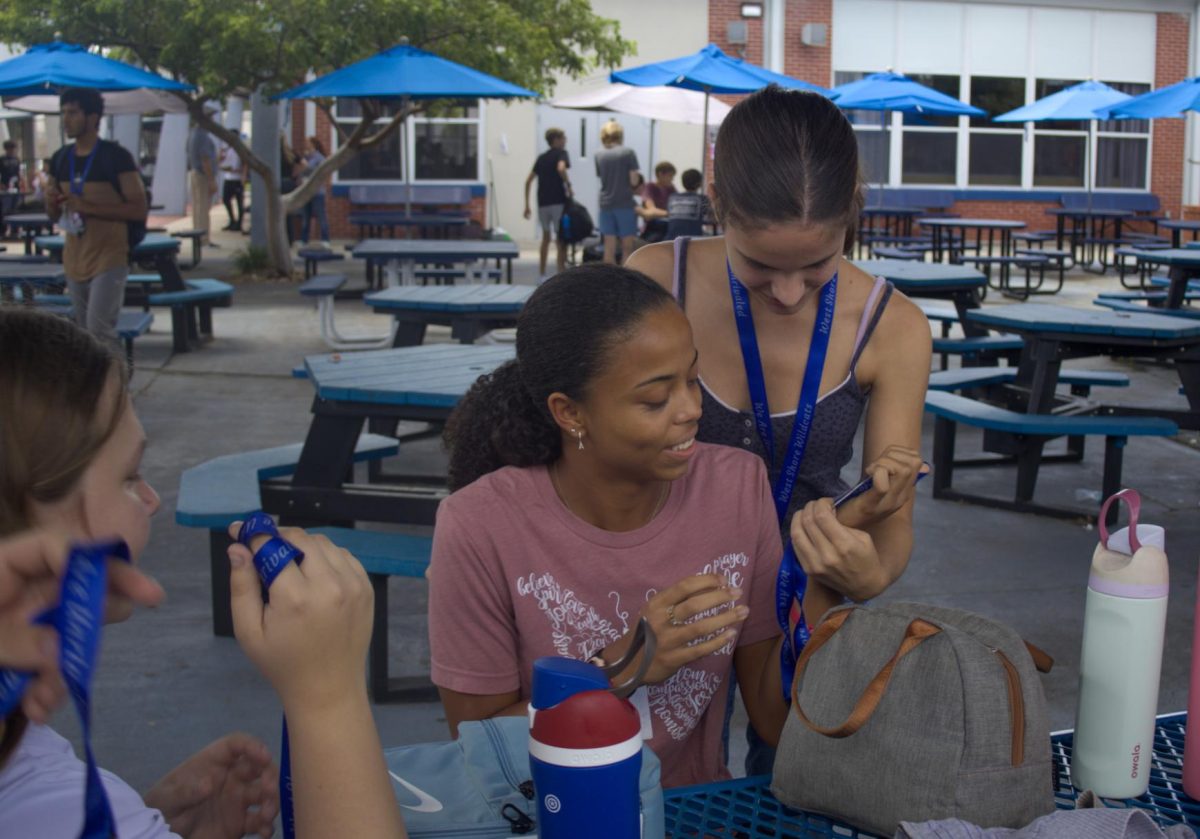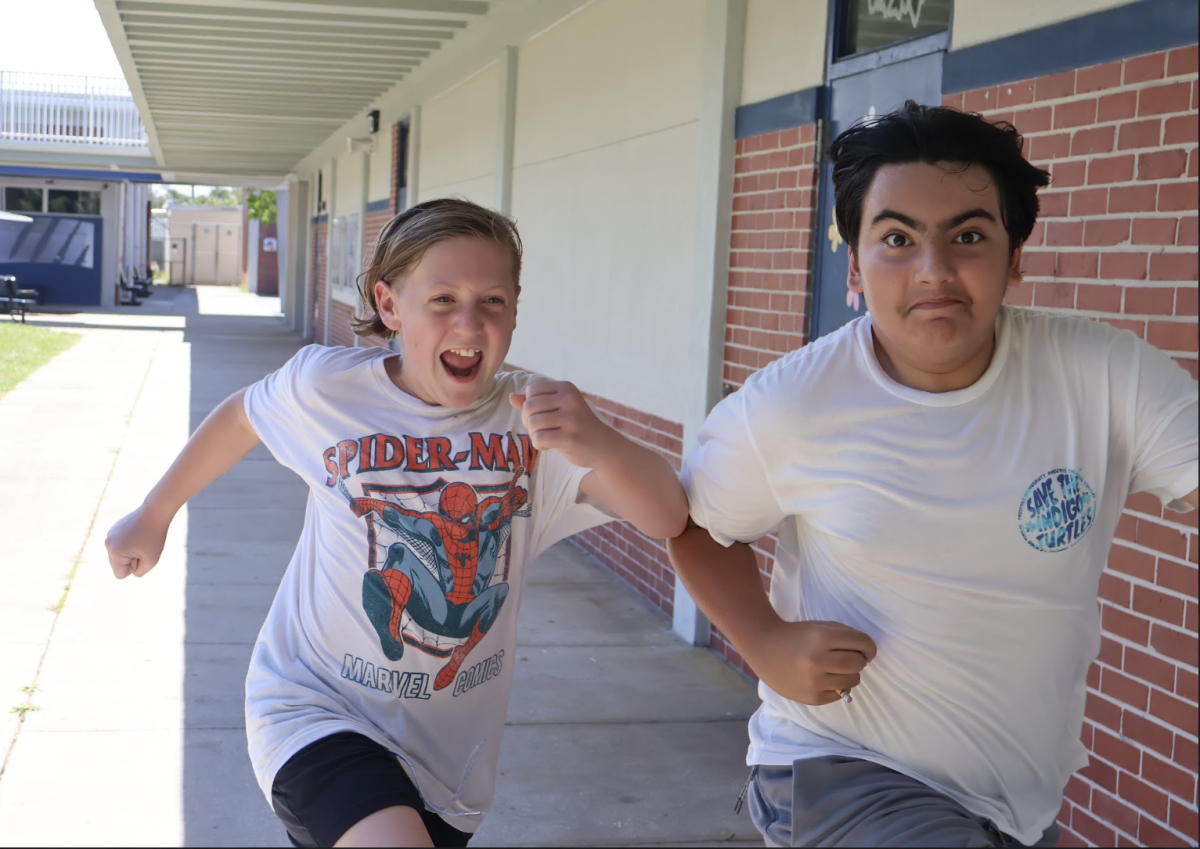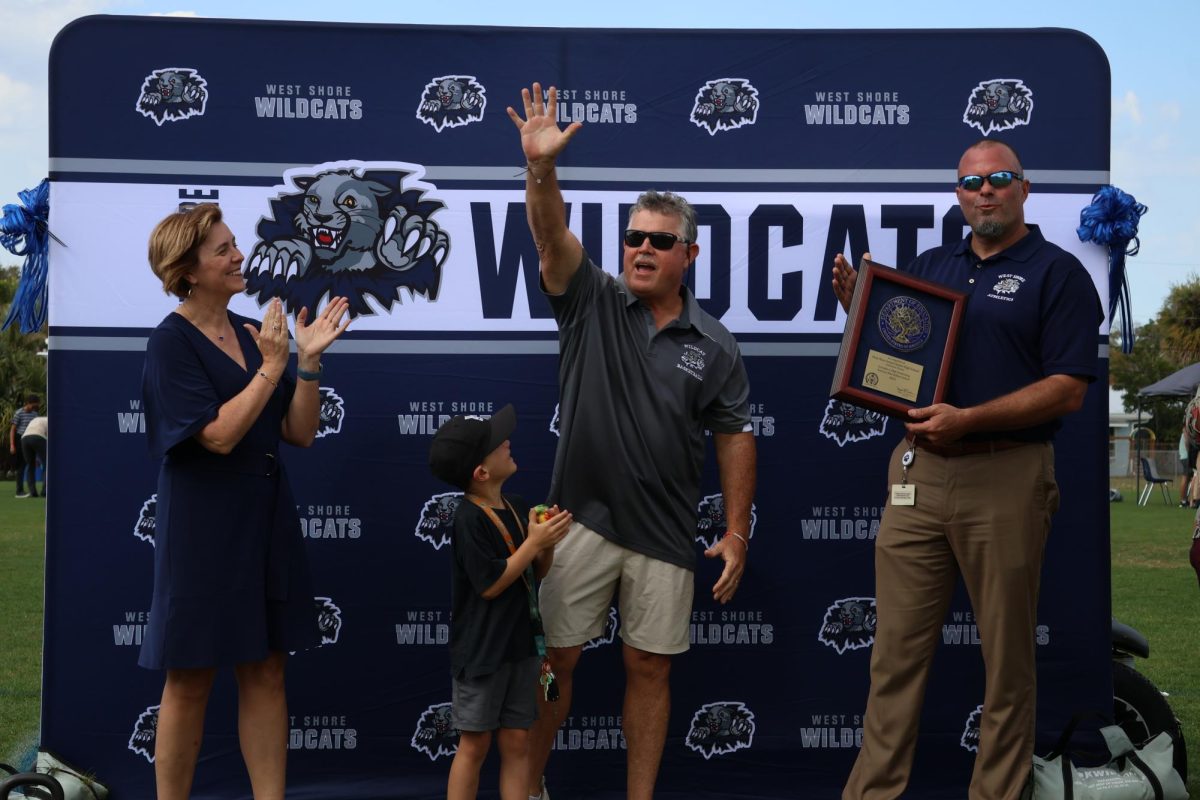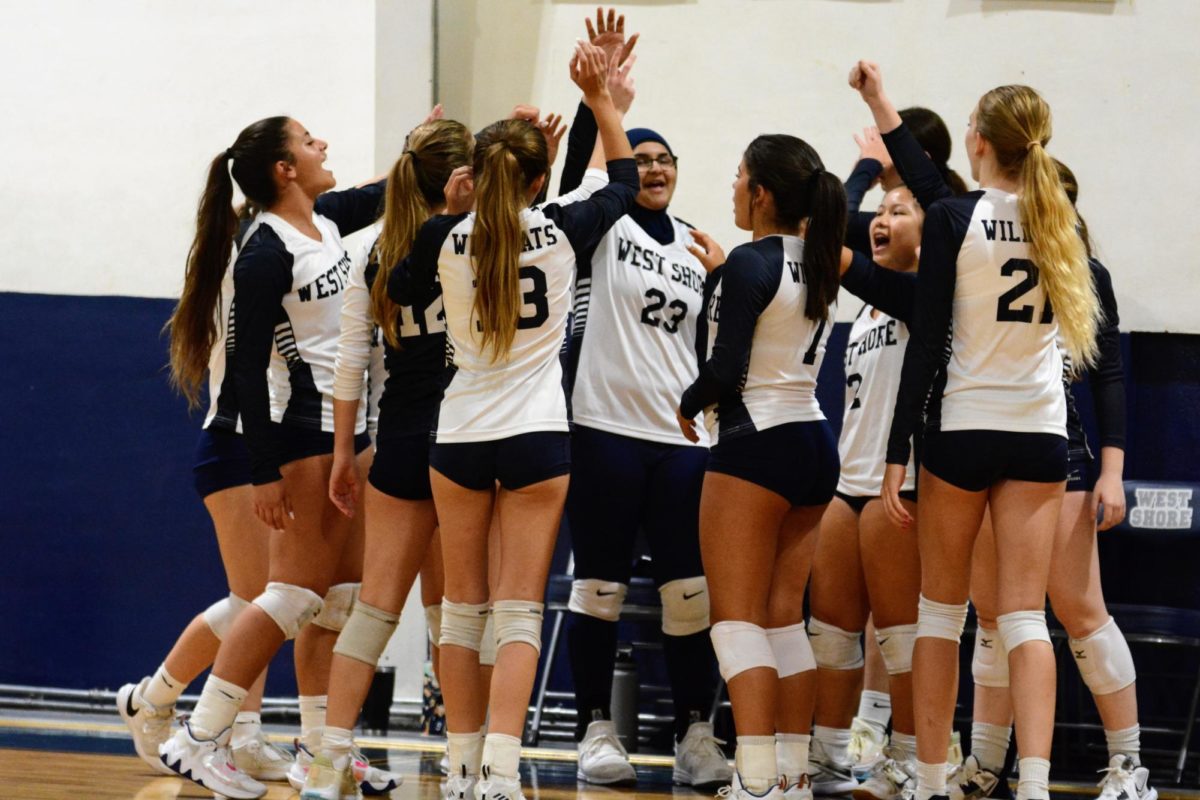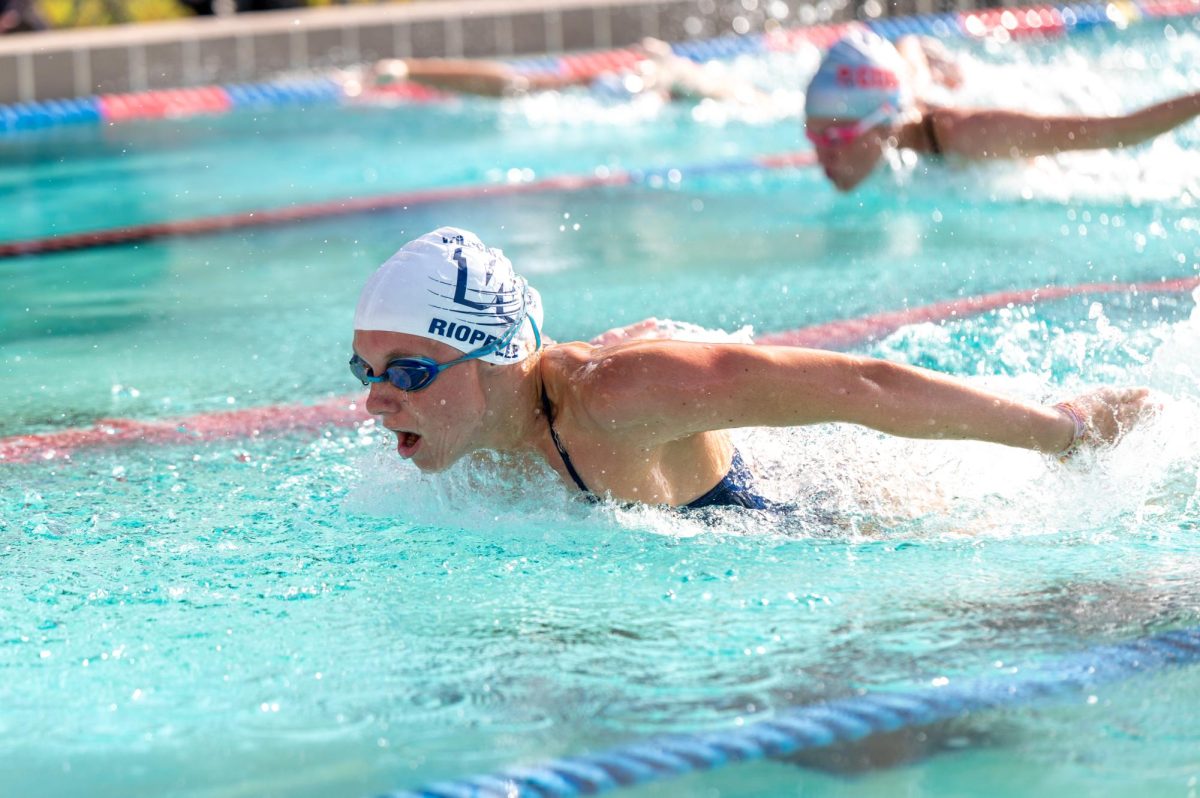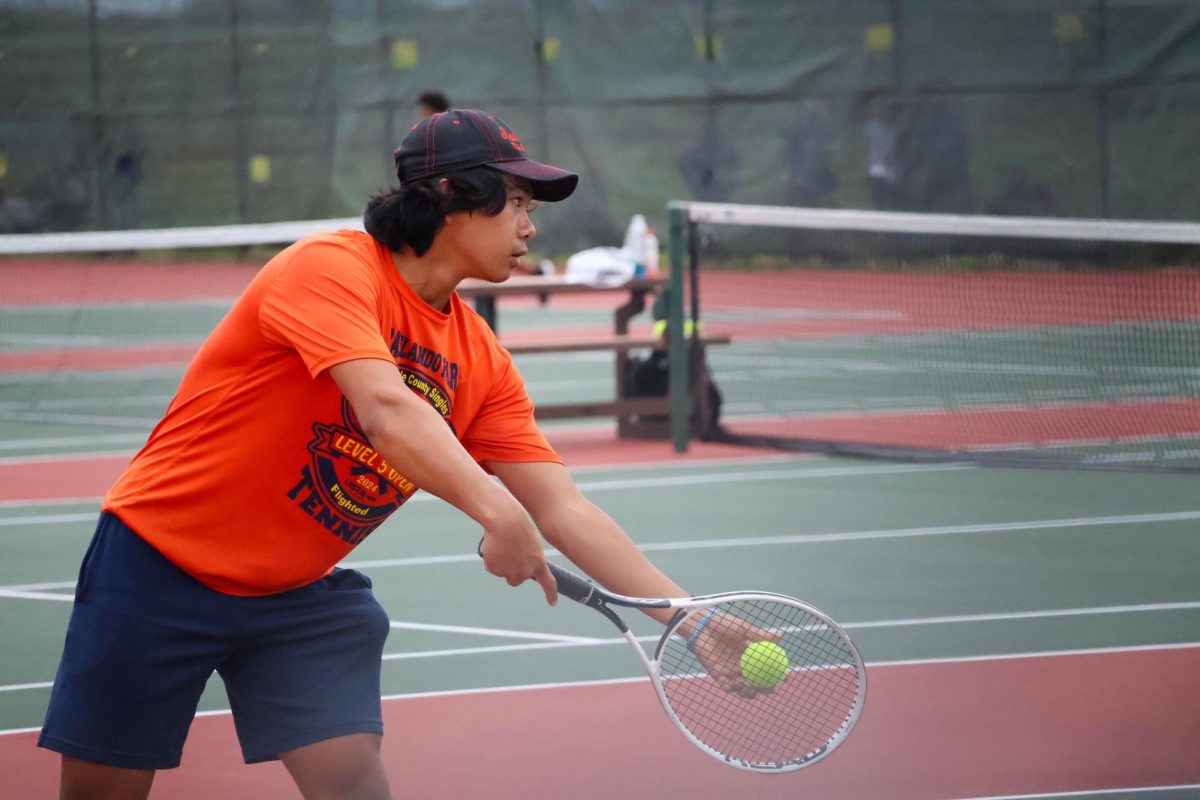Regrouping after the rally, senior and libero Olivia Luchetti looks at her teammates and knows they have her back, even with a hostile student section throwing curses and insults at the West Shore volleyball team. Luchetti said her bonds with her teammates allows her to keep her composure and maintain a sportsmanlike demeanor throughout the storm of slights coming their way.
“We always watch over each other and ensure that we’re playing a fair game and that we have good sportsmanship,” Luchetti said. “Even against Satellite, where we’ve had students sections that are cursing us out and saying racist jokes. At the end of every point, the team comes together and agrees, ‘Hey, just move on from it and work as a team.’”
Athletic Director Tony Riopelle spoke to all players of a fall sport in the gym Aug. 22. He had planned to hold the meeting about a week later, but moved the mandatory meeting up due to an indident within the Viera High School football team, in which a video was recorded and shared online of a player being harassed by his fellow teammates, who crowded around, watching and taping the scene.
“Our main goal is to have you leave our athletic programs better prepared for life than you entered them,” Riopelle said to the body of student-athletes who filled up the bleachers. “Sportsmanship is a big part of it. Character is a big part of it.”
The incident was labeled as hazing, prompting the immediate investigation of Viera’s football team. On account of the leaked video, rules requiring athletes to complete four National Federation of State High School Association video courses began to be enforced. Junior golfer and soccer player Antonio Artidiello expressed disdain for the courses, each of which provides a certificate of completion at their conclusions, which must be turned in to coaches.
“What happened at Viera is all over the media and how they’re getting reprimanded is enough of a warning,” Artidiello said. “[These courses] will just make me hate playing fall sports.”
The NFHS courses cover the topics of concussion, heat illness, sudden cardiac arrest, and hazing prevention. Girls’ golf and soccer coach Jenny Pazderak said while the short-notice introduction of these courses into fall sports was tough, they are beneficial for athletes.
“The athletes need to know about concussions, [and] they need to know about playing or running in the heat,” Pazderak said. “It’s hit or miss, but overall some of these courses are good.”
Pazderak said coaches often covered these topics with their athletes in years past, as coaches must take nine hours of specialized athletic coaching coursework to gain their coaching certification. Sophomore and cross-country runner Christopher Estevez said the way the courses are administered to athletes does not promote interest in the topics covered.
“It’s not something physical, which means you’re not going to pay that much attention to it,” Estevez said.
The Viera incident brought attention to negative traditions in Brevard County high school athletic programs.
“We’ve had our issues,” Riopelle said. “[The soccer team] had the fight with Viera last year. Our lacrosse team didn’t have a great culture. We had a coach that was all about the winning, who had a kid go through a handshake line and curse at the opposing coach.”
West Shore parted ways with that lacrosse coach after that year according to Riopelle, during which those types of incidents were not uncommon. In 2022, West Shore was honored as the Florida High School Athletic Association Class 3A Sportsmanship Award runner-up. Pazderak said she supports good sportsmanship on her girls’ golf and soccer teams.
“Everyone wants to win but you have to have the positive attitude and leadership to develop a good team,” Pazderak said. “Having good sportsmanship means the team wins together and they lose together.”
Pazderak said when a team develops a negative culture, they can be punished in their performance due to tension between players and coaches, decreased trust and ineffective leadership. Riopelle used Viera as an example of a team losing trust with each other due to its hazing incident.
“Well, can you imagine being that kid [in the video]?” he said. “That’s a bad culture. Just how are kids not saying ‘Hey, we shouldn’t be doing this.’”
Varsity basketball coach Corey Burton compared athletes coming to practice to showing up to school or a job, with players having to pay attention and listen but also step up as leaders on the court.
“In order to win, you have to establish good values and you have to do things the right way,” Burton said. “If you’re more talented, but you don’t have good values, you’re going to collapse. You’re going to fold in certain moments against people who do work hard.”
Luchetti said the volleyball team works hard to foster a welcoming environment, which feels like a family for new players.
“Upperclassmen treat any underclassmen like their younger sister,” Luchetti said. “Everyone looks up to each other or treats themselves as someone to look up to. That way the younger girls have good influences.”
According to Luchetti, team chemistry is one of the most important aspects of a good volleyball team. She said that without toxicity within the program, the volleyball teams are able to thrive as cohesive units.
“No matter how many talented players or skill levels you have on the team, if you don’t have the chemistry and the bond to play as a cohesive team on the court, there is almost no chance you can compete against anybody else,” she said. “You can’t be playing a game against your teammates.”
Former West Shore volleyball player Sally Kempfer had her coach leave the team mid-season during her junior year, describing that year’s team as a “motley crew.” She said that year inspired her to try to build close relationships on the teams she now instructs in her second year as assistant and Junior varsity volleyball coach.
“I like to see those numbers on the board, but at the end of the day, it’s about building character,” she said. “I’m a big advocate of building a team that can rely on one another and can convey that family relationship.”
Junior soccer player Athan Zaiden said having a positive team culture leads to wins and behaves as a model for younger student-athletes.
“We set an example for seventh to eighth graders coming into high school and it sets a standard for our school and for the future,” Zaiden said. “We go on the field as a team and we leave the field as a team.”
Luchetti said leaning on her teammates is key to staying composed during matches.
“Especially against Edgewood’s team—it’s our rival school—things get heated,” she said. “We always just kind of keep our cool and focus on the game as a team.”
Riopelle said even when a program has outstanding talent, the mental game and a positive culture will always be the most important part of high school sports.
“At the high school level especially, it comes down to what’s between your ears,” Riopelle said. “That’s what it’s all about.”


![Sophomore Isabelle Gaudry walks through the metal detector, monitored by School Resource Officer Valerie Butler, on Aug. 13. “I think [the students have] been adjusting really well," Butler said. "We've had no issues, no snafus. Everything's been running smoothly, and we've been getting kids to class on time.”](https://westshoreroar.com/wp-content/uploads/2025/08/IMG_9979-1200x800.jpg)






















